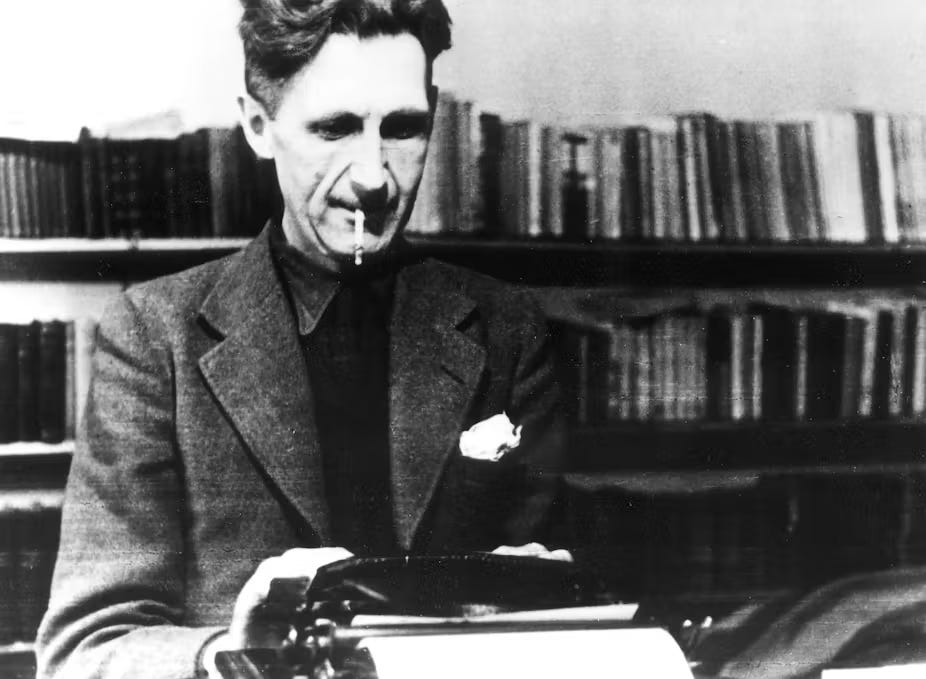Cold war. It is a juxtaposition we are used to, and it is brilliant. But who came up with the idea of calling it that? I did some research and George Orwell was the answer. The novelist, that’s right.

The way Orwell links this concept of the cold war to science fiction surprised me even more. There's an article he wrote in the Tribune on October 19, 1945, “You and the Atomic Bomb,” where he writes:
For forty or fifty years past, Mr. H. G. Wells and others have been warning us that man is in danger of destroying himself with his own weapons, leaving the ants or some other gregarious species to take over. Anyone who has seen the ruined cities of Germany will find this notion at least thinkable.
Nevertheless, looking at the world as a whole, the drift for many decades has been not towards anarchy but towards the reimposition of slavery. We may be heading not for general breakdown but for an epoch as horribly stable as the slave empires of antiquity. James Burnham’s theory has been much discussed, but few people have yet considered its ideological implications — that is, the kind of world-view, the kind of beliefs, and the social structure that would probably prevail in a state which was at once unconquerable and in a permanent state of ‘cold war’ with its neighbors.
Had the atomic bomb turned out to be something as cheap and easily manufactured as a bicycle or an alarm clock, it might well have plunged us back into barbarism, but it might, on the other hand, have meant the end of national sovereignty and of the highly-centralised police state. If, as seems to be the case, it is a rare and costly object as difficult to produce as a battleship, it is likelier to put an end to large-scale wars at the cost of prolonging indefinitely a ‘peace that is no peace’. [Full version here]
According to what I have been able to find, this is the text in which the term cold war was first used.
Is war peace?
In his masterpiece Nineteen Eighty-four, Orwell writes that one of the slogans of the Party (the political equivalent of totalitarianism disguised as benevolent control) is "War is Peace".
Is war peace?
No, war cannot be peace, but it can be a “peace that is no peace”. These are concepts familiar to Orwell. So, he correctly invents the term cold war to describe a state of apparent peace that is not peace at all. It is a war without fire and flame, a silent war, cold only on the surface. Then, in 1947, cold war is taken up by the journalist Walter Lippmann in his geopolitical essay “The Cold War: A Study in U.S. Foreign Policy”. Here, cold war defines a bipolar system that pits the United States and the Soviet Union against each other on a global scale.
Predictions coming true
But why does Orwell make this connection with science fiction? Perhaps because those who write and read science fiction are immediately aware of how people's imaginations are changing. It is like having a special sensitivity that leads you to explore possibilities, developments, perspectives that go in so many directions. It is capturing the future and putting it in the box of a book, knowing that it is only an approximation. Anyone who reads science fiction knows that one of the biggest emotions you feel is the unease associated with the possibility of predictions coming true.
Dawn-waiting Sentinels
And indeed, Orwell points out how certain geopolitical contrasts, the development and use of terrible weapons, the destructive power of “invasions” of other people’s territory can lead to disaster. I won’t go into that big topic here, but think about how much science fiction of the 1950s and 1960s recalls the cold war in more or less obvious ways, even just by putting the Soviet Union on Mars. Think of artificial intelligence: How many science fiction novels and stories today explore all the possible developments, benefits, or pitfalls of using AIs?
That’s why to me, science fiction writers are like “dawn-waiting sentinels”, watching the future and trying to anticipate problems and solutions. Or maybe not, maybe they are just storytellers trying to make sense of what they see, fascinated by the incredible power of the “What if”.
What about you? Do you ever feel like a dawn-waiting sentinel?
Thanks for reading!
Orwell’s essays and articles
Freedom and Happiness – Review of We by Yevgeny Zamyatin (Tribune, 1946)
Just Junk – But Who Could Resist It? (Evening Standard, 1946)
Politics vs. Literature: An examination of Gulliver’s Travels (Polemic, 1946)
Spilling the Spanish Beans (New English Weekly, 29 July and 2 September 1937)
The Proletarian Writer (BBC Home Service and The Listener, 1940)
Here for more: THE ORWELL FOUNDATION





We didn't have the "Senior Thesis" in my school days, but if we had, mine would have been "George Orwell's "1984:" Blueprint for a Glorious Future!"
It would have combined the society described in the book with the rhetoric of all my authority figures from my mother to school teachers to Dick Nixon, arguing in favor of the police state on steroids that Orwell imagined.
It's purpose, of course, would be to terrify the authority figures who would read it.
This was super interesting!
Love me some Orwell. Great piece :)